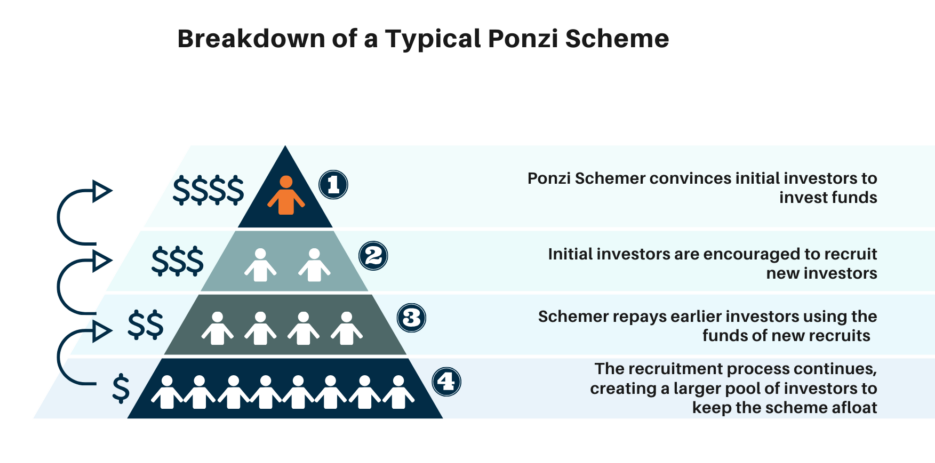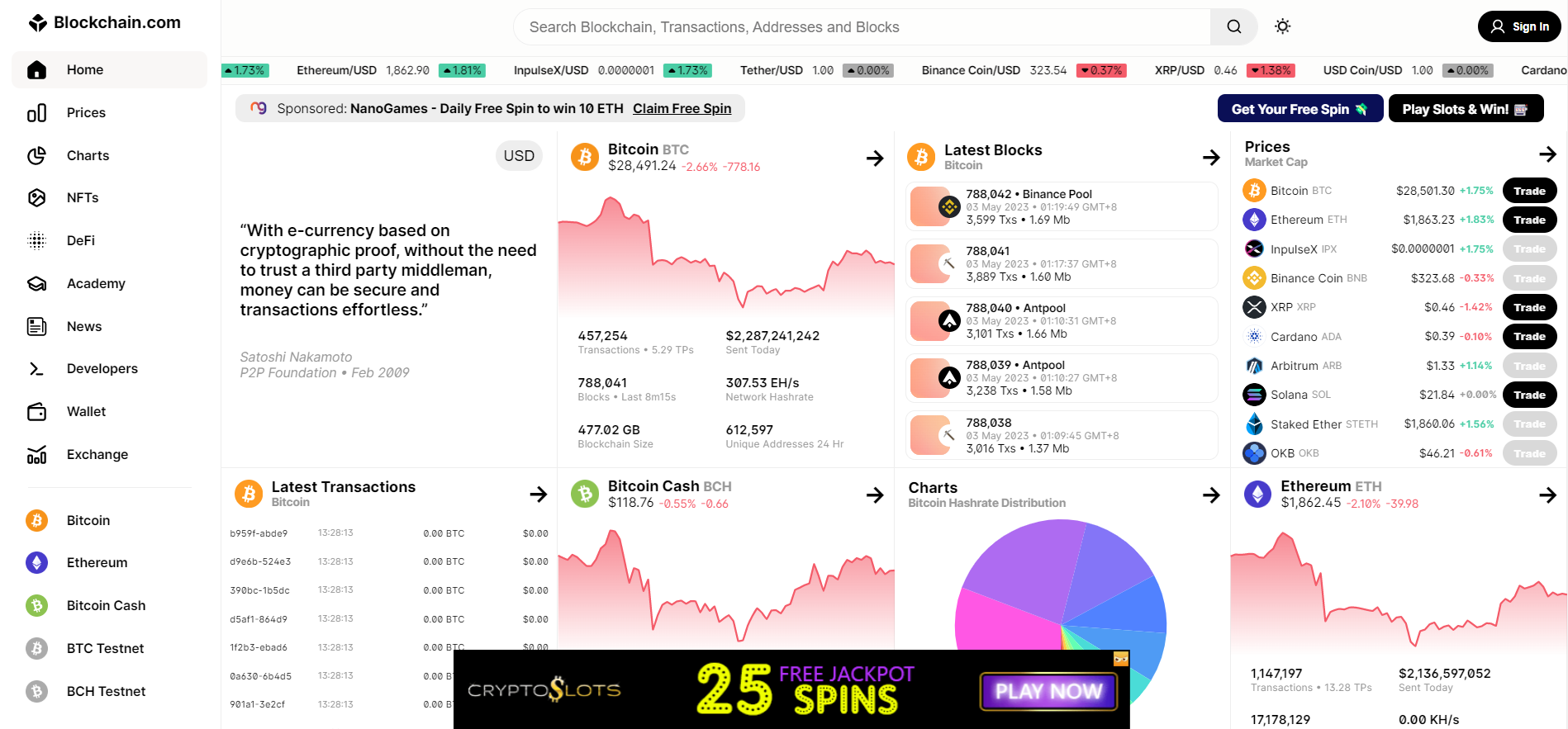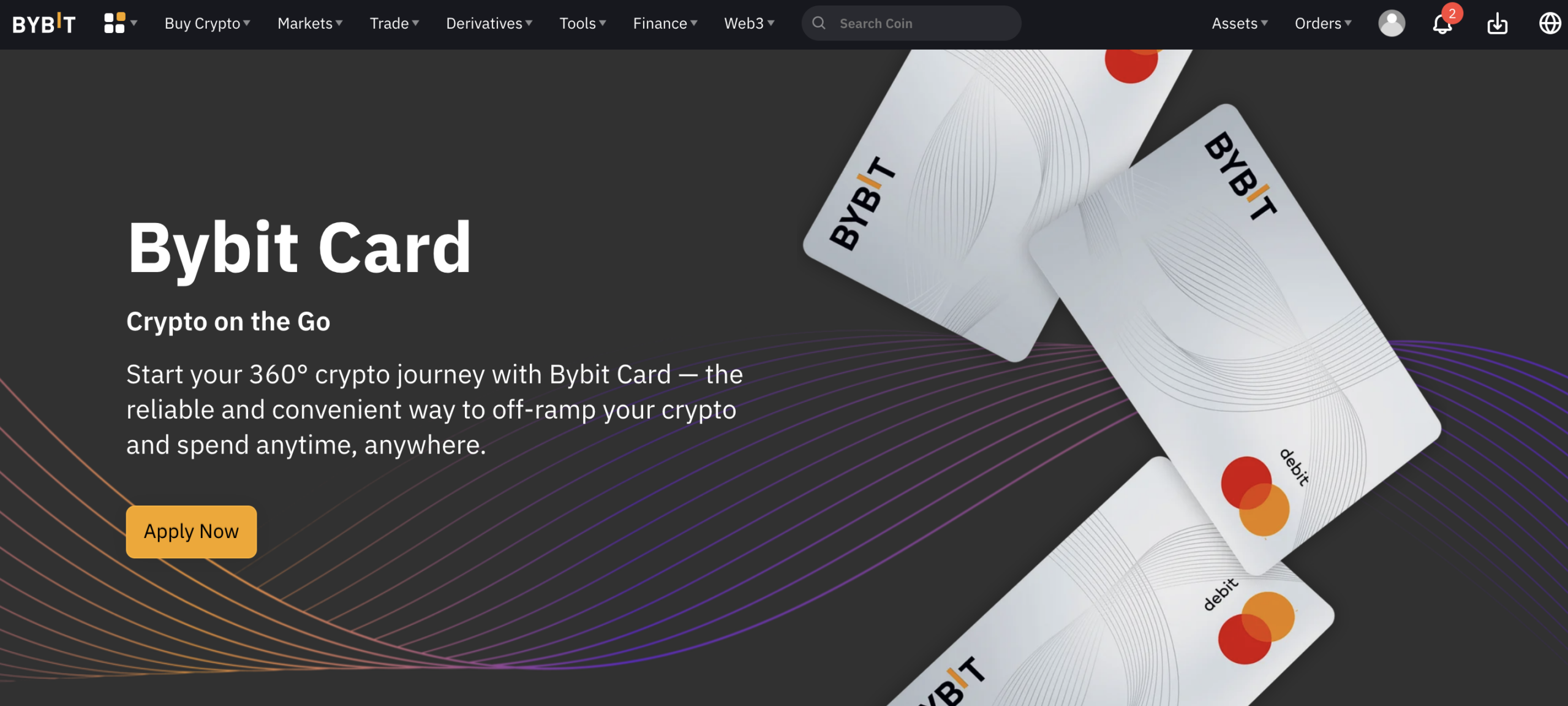Bitcoin Ponzi Schemes: What Are They & How To Spot Them
Many in the media and finance industry have decried Bitcoin as nothing more than a Ponzi scheme. Such claims can ward off investors. However, in reality, Bitcoin shares very little in common with a true Ponzi scheme.
- A Ponzi scheme, a type of fraud, involves an individual (or syndicate) soliciting cash investments from investors and misusing those funds.
- Bitcoin is not a Ponzi scheme.
- The coin's fundamental use case and decentralized governance immediately differentiate it from a Ponzi scheme.
- Ponzi schemes are a feature of other, less reputable digital currencies, but can still be avoided with adequate vigilance.
TABLE OF CONTENTS
Ponzi schemes are a relatively common cryptocurrency investment scam. While other cryptocurrencies can be the work of fraudsters, Bitcoin, one of the most reputable coins, is far from it. Bitcoin's decentralized governance and underlying use case are just two elements that differentiate the virtual currency from a Ponzi scheme. This guide will explore what exactly a Ponzi scheme is, how to spot one, and why Bitcoin can't be considered one.
What Is A Ponzi Scheme?
A Ponzi scheme is an investment scam that relies on trickle-down investing, much like a pyramid scheme. In most cases, an investor will make a cash payment to the scheme managers in exchange for the promise of high returns and exclusive investment opportunities. Often, these funds are never actually invested and are used to pay off early investors, which will “prove” to investors that the operation is legitimate. Sometimes, investors' returns are paid off by their very own lump sum.

A typical Ponzi scheme will end in a couple of ways. The fraudsters often burn through the cash and fold their “business,” pocketing whatever remains of their investor's money. New investors might slowly dry up, meaning the scheme can no longer pay out its earlier investors.
Ponzi schemes target vulnerable and financially illiterate groups. Some convoluted Ponzi schemes appear extremely legitimate, building a modern website with hundreds of seemingly real reviews.
Does Bitcoin Work Like A Ponzi Scheme?
No, there is very little about Bitcoin that resembles a Ponzi scheme. Knowing how the Bitcoin blockchain works quickly tells us that BTC is a legitimate investment asset. Given that only 21 million BTC can ever reach circulation, the price of Bitcoin is largely at the mercy of supply and demand. These economic metrics are completely irrelevant to a Ponzi scheme. In general, Bitcoin's blockchain has been publicly available for a decade and has a provable functionality – the vast majority of Ponzi schemes have no underlying function whatsoever.
Although, it's simple enough to understand why some pundits have accused Bitcoin (and crypto) of being little more than a Ponzi scheme. Bitcoin's underlying functionality is largely speculative. It isn't a tangible asset, it has historically offered “too good to be true” returns, and many investors are attracted via word of mouth and referrals.
Differences Between Bitcoin & Ponzi Schemes
| Ponzi Scheme | Bitcoin | |
|---|---|---|
| Duration | 1-2 years on average | 10+ years |
| Governance | Ran by just one person or one group of scammers | Decentralized, network is operated by 1m+ Bitcoin miners |
| Returns | Paid out from other investor’s money and is always guaranteed (until the scammers pull the rug) | Depends on supply and demand – no guaranteed returns |
| Supply | Unlimited – as long as there are new investors, the Ponzi scheme has no reason to stop | 21 million Bitcoin |
| Underlying function | Varies, but usually non-existent. Some schemes will be built on the back of legitimate businesses, like Madoff’s “Wealth Management branch”. | Store of value, international payment method, private transactions |
1. Not controlled by a person or company
A single person, entity, or group almost always controls Ponzi schemes. This central authority is in charge of the entire scam and will usually be heavily involved in soliciting investors and stealing people's money. A truly decentralized Ponzi scheme is near impossible, as the main perpetrators would be unable to siphon money from investors.
Bitcoin is one of the most identifiably decentralized cryptocurrencies, with no one person or company controlling a significant portion of the coin's supply. Therefore, every time people buy Bitcoin, their money isn't going to the same person or business as it would with a Ponzi scheme. Additionally, more than one million Bitcoin miners are responsible for maintaining and updating the Bitcoin network – and each contributor is independently verifiable due to the public nature of the blockchain.
2. No promises of guaranteed returns
Bitcoin's extreme volatility is one of the reasons that it is labeled a Ponzi scheme, as the asset can soar in value by 10% in a matter of days, but just as quickly lose more. However, this same volatility and potential to lose money is further proof of the opposite – a Ponzi scheme will initially provide stable returns as the scammer steals cash from new investors to pay out dividends. Bitcoin's unstable value suggests it isn't being controlled by an illegitimate agency and is instead largely dictated by supply and demand economics.
3. 100% transparent and decentralized
A Ponzi scheme, by nature, is never transparent. Admittedly, certain schemes will be built on the back of a legitimate business. However, the telltale sign of a Ponzi scheme is investments that go nowhere – when actual products are involved in the scam, this is usually considered a Pyramid scheme. Investors buying into a Ponzi scheme will be told their cash is going somewhere, but it will instead go somewhere else – usually the scammer's bank account.
Conversely, Bitcoin's transaction data is stored on a public ledger. This means an easily accessible record is left behind every single time BTC is sent, received, or purchased. No one person is in charge of directing investment flow—a decentralized system verifies every Bitcoin transfer. Crypto investors can see where their money is going, as everything is completely transparent.
4. The validity of the investment can be confirmed on a public ledger
Bitcoin is a public blockchain; therefore, all transactions made on the network can easily be confirmed using a block explorer with a Bitcoin transaction ID. Any time somebody buys Bitcoin, a record of that investment is noted on a block. That block's specific ID can then be followed up via a platform such as Blockchain.info to see how much Bitcoin has been received, who received it, and where it has come from. A Ponzi scheme would never publicly disclose such information; if it did, it would be intentionally misleading and unverifiable.

5. Limited supply that will run out
A Ponzi scheme will typically run for as long as possible until new investors dry out or the scammers are caught and forced to stop operating. It is in the best interests of Ponzi scheme promoters to keep an unlimited supply to continue attracting new victims. On the other hand, it is incredibly easy for Bitcoin investors to assess the coin's current, total, and maximum circulating supply.
The blockchain has a baked-in code that only allows 21 million BTC to reach circulation. This leads to BTC's value being primarily dictated by supply and demand economics rather than difficult-to-define and deceitful metrics that would be present in a Ponzi scheme.
6. No pyramid structure
The trickle-down, word-of-mouth structure typical of a pyramid scheme is also present in a Ponzi scheme. Someone at the top will offer a victim an investment that's too good to be true, who will then spread the word to their friends after receiving a few months of “legitimate returns.” This flow will continue downwards and outwards until the Ponzi scheme has potentially roped in hundreds of victims.
On the other hand, Bitcoin inherently lacks this structure due to its decentralized nature. There is no single entity at the top, nor larger levels of “management” (promoters) underneath, the way there is in a Ponzi scheme. Instead, Bitcoin is more of a web of interconnected dots, each controlling a minuscule portion of the blockchain's supply and distribution.
7. Does not require complex investment requirements or strategies
More successful and wide-reaching Ponzi schemes tend to require convoluted investment terms, such as lock-in contracts, high minimum spending, and multiple transfers to launder incoming cash flow. A Ponzi scheme will usually only have one or very few investment brokers.
Alternatively, investors can buy Bitcoin from hundreds of sources. The asset can be purchased directly from a friend or family via one of many legitimate centralized/decentralized exchanges, investment managers, or crypto brokers. The only requirements to purchase are usually passing Know Your Customer (KYC) verification. Investors who want minimal risk can even buy fractions of a Bitcoin.
8. Legitimate use cases
Ponzi schemes don't always invest in anything at all, meaning there cannot be a legitimate use case other than lining a scammer's bank account. Promoters will often push an investment that makes little real-world sense or has minimal underlying value, such as vague wealth management services or shady brokerages investing in penny stocks/altcoins.
Bitcoin, on the other hand, has come a long way since its inception in 2009 but still maintains its foundational use case. It was intended as an alternative form of currency where sovereignty over income was handed back to the consumer. Additionally, Bitcoin can be used as a mode of international exchange, a store of value, and a way to make anonymous payments. A good example is using a Bitcoin debit card to pay for real-world goods and services.

9. Self-storage
A Ponzi scheme will usually take the form of an “investment” or “wealth manager,” where the investor must give up control of their funds in exchange for guaranteed returns. Ponzi schemes will generally make it difficult for investors to access their investments by restricting liquidity and selling opportunities.
However, investors who utilize self-storage can maintain complete control over their Bitcoin and other digital assets. Investors own their private keys, meaning they can add to, or sell, their investment portfolio whenever they please. One of the best ways to hold Bitcoin is using a hardware wallet.
This Is How You Can Avoid A Cryptocurrency Ponzi Scheme
- Avoid projects with promises of high guaranteed returns. Most crypto Ponzi schemes will imply that buying a certain coin will guarantee a successful investment. In reality – especially in a market as volatile as crypto’s – no investment can ever be guaranteed. This should be the first sign of a potentially shady project.
- Be wary of social media hype. Be wary if there is lot a of social media presence around the project, especially if the comments are copy-pasted claims of riches, mooning, and 100% returns.
- Be cautious of strange investment terms. Decentralized exchanges can be an easy way for Ponzi scheme operators to set up obscure and harmful investment terms. For example, the Bitconnect Ponzi scheme from 2016 required investors to lock up their new tokens for a certain amount of time to rake in yields of 120%. While the rewards were initially paid out, they slowly dried up. By the time investors cottoned onto the scam, the developers had already taken off with billions of dollars in cash. Investors were left unable to do anything due to the lock-up terms of their investment.
- Restricted centralization. Cryptocurrencies are typically decentralized in nature, but this doesn’t stop centralization from occurring during a Ponzi scheme. For example, be careful of tokens that can only be traded on one crypto exchange – particularly if it’s relatively obscure, has minimal trading volume, and strict withdrawal limits.
- Anonymous developers and minimal function. Watch out for projects that don’t release a public whitepaper, road map and are deliberately misleading/vague about what the cryptocurrency is actually intending to accomplish. While many legitimate projects still have anonymous developers, this should still be a red flag that prompts further investigation.
Frequently Asked Questions
Why is Bitcoin not a Ponzi scheme?
Bitcoin does not share any of the tell-tale signs of a Ponzi scheme. The coin does not generate consistent returns and goes through long periods of sideways or even downward price movement. The cryptocurrency is decentralized, lacks a pyramid governance structure, and all transactions are tracked via a public ledger. In addition, BTC has a limited supply of 21 million, which can be easily verified with a block explorer.
Is Bitcoin a Ponzi or pyramid scheme?
No, Bitcoin is neither a Ponzi or a pyramid scheme. Certain individuals and groups have accused it of being a scam due to its high returns during bull runs and speculative use-case. However, BTC also experiences significant losses – which a Ponzi scheme almost never will – and has a solid foundational use case as a payment alternative and store of value.